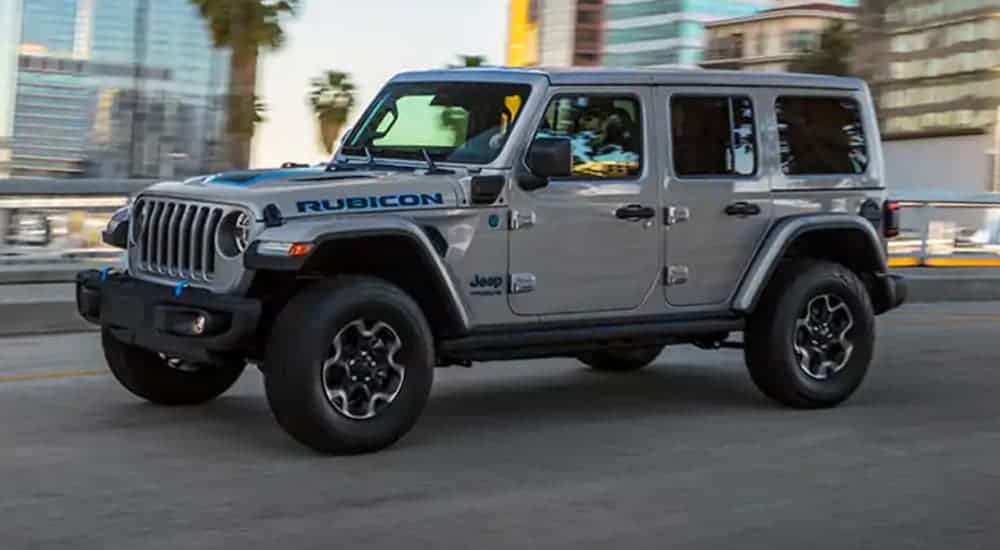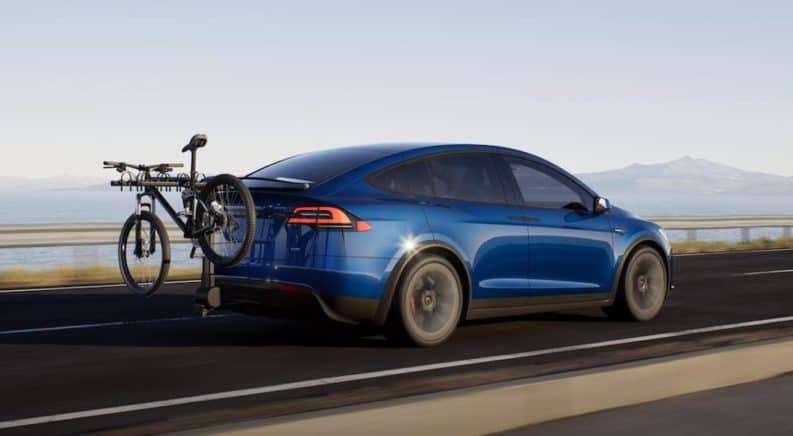If you’re scoping out used cars and using Google as your shopping tool, you’re probably plugged into the latest automotive industry news. Even a shallow dive into the used car market tends to reveal certain trends. Things like resale value and quantity of inventory give us clues to which vehicles are more popular, but paying a little closer attention to what’s happening in the news can help guide you to a better long-term financial decision than just knowing which cars are trendy.
Let’s look at the automotive industry in 2021. If you scan today’s automotive news headlines, you’ll see one common theme: electric vehicle technology. Is this a short-term trend designed for a small segment of the market, or can we expect the industry to fully transition to all-electric new vehicle fleets in the not-too-distant future? If you’re in the market for a used car or truck, the answer to this question is an important one.
Typically consumers keep their cars for at least a few years, which means knowing short-term market trends is critical to your decision. You can predict the relevance of vehicle features, such as fuel efficiency, connectivity, and powertrain type, simply by catching up on a few current events, ultimately putting you in a better position when it comes time to sell or trade your vehicle.
Where else can we find clues that will help us make better decisions? The answer might surprise you. Here we take a look at a few of the headlines that caught our eye; news that might impact the value of your next car when it’s time to sell.
FCA Chrysler and PSA Group Merger

Two of the largest global auto manufacturers, FCA Chrysler – the parent company of Fiat, Chrysler, Jeep, and Ram, to name a few – and PSA Group (Maserati, Alfa Romeo) have merged under the name Stellantis. While the merger was announced in 2020, delays pushed it to 2021. Why is this relevant to your used car purchase? One word: electrification.
The companies merged to create an estimated operating cost savings of nearly $6 Billion, freeing up cash to pursue advanced electric technology. According to a January 19, 2021 Car and Driver article, company representatives have shared that increasing the lineup of electric vehicles is “a focal point.” If you’re eyeing a gas-powered car or truck, give some thought to how long you plan to keep it.
While the market for electrified vehicles is still small (in fact, U.S. electric vehicle sales dropped 12% in 2019), as carmakers incorporate electric technology into larger vehicles and scale battery technology, so these vehicles are more affordable, that number is expected to rise. Consumer confidence in electric vehicle technology is on the rise, thanks to automakers building batteries with longer range and the national increase in battery charging station infrastructure.
This powertrain advice is even more important if you’re looking to buy a smaller vehicle. The top three electric vehicles sold in the U.S. since 2012 are all compact-sized. They include the now-discontinued Chevy Volt, the Nissan Leaf, and the Toyota Prius. Given market share for EVs is higher in this category – and showing no sign of slowing down – buying a traditional gas-powered compact car may not yield the best resale value. Isn’t it better to buy ahead of the curve?
The Shutdown of the Keystone XL Pipeline
On his very first day in office, newly-elected President Joe Biden signed an Executive Order to cancel permits for the Keystone XL Pipeline. The pipeline was expected to transport nearly 800,000 barrels of oil per day to the U.S. in a trade deal with oil-rich Alberta, Canada. Biden’s reversal signals a new era of climate-focused governance and a recommitment to alternative energy.
How does this impact your vehicle purchase? It stands to reason that without the Keystone XL Pipeline, U.S. dependence on foreign oil will increase, meaning price instability and supply concerns are sure to follow. That can only mean unrest at the gas pump, making hybrid and all-electric vehicles even more appealing. If we’re already seeing signs of a shift, it stands to reason that this will only get worse (or better?) in the next few years.
Sure, any change will take a while to settle in and have a real impact on the market, but under Biden’s leadership, we can expect to swing in the direction of higher fuel prices and possibly more government incentives for battery development and alternative fuel companies. Buying a gas guzzler now may prove to have long-term resale implications in just a few years.
Big Tech and the Auto Industry
GM owns an automotive technology company called, simply, Cruise. The company exists to create self-driving technology and is the hub for the company’s groundbreaking SmartCruise technology. SmartCruise is a handset-free cruise control system that relies on ‘smart’ highways and uses sensors to read the road and keep a vehicle in its lane and traveling at a safe speed relative to the car ahead, all without the driver’s assistance.
On January 19, 2021, Cruise announced a long-term partnership with tech giant Microsoft to “accelerate the commercialization of Cruise’s all-electric, self-driving vehicles.” Microsoft will infuse over $20 billion of capital into Cruise and work on cloud-based solutions that support self-driving technology. The goal of the partnership, says company executives, is to create cleaner, safer driving solutions. Self-driving vehicles are said to reduce emissions (via all-electric powertrains), traffic congestion, and collisions. The technology creates a symbiotic relationship between vehicles while traveling, maintaining distance, and optimizing driving patterns to eliminate frustrating gridlock and maintain a never-seen-before level of order on our highways.
This announcement tells us that connectivity and cloud-based vehicle operating systems are necessary components for inclusion into this technology. Vehicles that contain advanced connectivity systems can receive over-the-wire updates and possibly receive upgrades that equip them with self-driving capability. Why does this matter to you? A vehicle without at least an infotainment touchscreen and smartphone connectivity is going to age ungracefully, and when it comes time to trade or sell it a few years from now, it will seem out-of-date and less valuable – and this will likely be reflected in its resale value.
Times Are Changing
Today’s headlines point to a few certainties: first, most – if not all – global auto manufacturers are positioning themselves to invest billions in electric and self-driving vehicle technology. That means what you buy now matters. Advancements in electric vehicle technology seem to be following a similar trajectory as other tech-heavy consumer products, like flat-screen TVs. However, this also puts you in a prime position to buy a used model. As electric vehicle technology begins to rise, prices on used gas models or early electric models are going to drop. So, now is the prime time to take advantage of those shifting prices.
Early electric vehicles were prohibitively expensive, which meant only a select few enthusiasts were able and willing to buy them. Today, we see affordable hybrid and electric vehicles winning more-and-more customers each quarter. Given the investment in alternative energy and the current administration’s indirect consent, we can expect to see a global trend toward products that take advantage of this technology. In fact, this has already been happening to the point where you can find reliable and advanced hybrid and electric vehicles on the used lot.
The speed of innovation and the trends of the market can play a huge role in the pricing and availability of used cars now. As trends change, you will see people returning recent models for something with the latest flashy feature. As technology advances, you can see prices on electric and hybrid vehicles dropping. Whatever you decide to buy, we recommend skimming the headlines and getting a sense of what the market will look like a few years into the future. It just might save you thousands.





